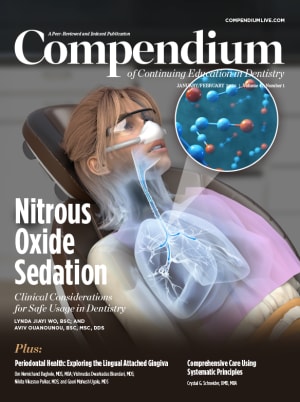Early Care in Children: The Importance of Establishing a “Dental Home”
Joe B. Castellano, DDS
Early dental care is essential in establishing and maintaining optimal oral health in children. This is why it is so important for parents and caregivers to begin to establish regular dental care at infancy and continue it through adolescence and into adulthood.
The American Academy of Pediatric Dentistry (aapd.org), whose vision is "Optimum Oral Health for All Children" and which serves as a valuable resource for dentists and hygienists needing information on the early treatment of children, recommends the child's first visit be at the time of eruption of the first tooth and no later than 12 months of age, ie, the child's first birthday.1 The first visit allows for the establishment of a "dental home." The dental home is defined as the ongoing relationship between the dentist and patient, inclusive of all aspects of oral healthcare delivered in a comprehensive, continuously accessible, coordinated, and family-centered way.2 Continuity of care is a key component of a dental home, which is why it is imperative that parents have a place to take their child on a regular basis for routine examinations and cleanings and when an emergent situation arises.
Early visits center on prevention and education. During the examination of a very young patient, ie, aged 3 years and under, a comprehensive oral examination is conducted, and a prophylaxis and topical fluoride treatment is provided if or when necessary. A caries risk assessment is performed in which the child's risk for decay is evaluated, preventive strategies are developed, and future recall needs are determined.1 Anticipatory guidance and counseling also is given at this visit. The parents are instructed on the child's dental development and the milestones the child should reach as he or she grows and matures. Topics such as tooth eruption, oral hygiene, oral habits, and dietary habits are typically discussed and are specifically related to the patient's age. Trauma, and what to do should it occur, is usually covered with the parent. As the patient grows older, examinations may incorporate x-rays, and age-appropriate topics such as tobacco and smoking, athletic mouthguards, and more complex discussions about diet may be included.
Starting visits by the first year of age allows dentists to begin educating parents on the oral health of their child and reducing the chance of disease. Also, determination of the child's caries risk through early examination can allow the dentist to detect decay or other pathology early and prevent the need for extensive treatment. Education of parents on the caries process can help them understand how oral hygiene and diet affects their child's risk of decay. It also helps them create and maintain proper oral hygiene habits for their child. Additionally, determining the child's caries risk status helps the practitioner develop a comprehensive caries prevention plan to prevent children from developing decay as they mature. The plan may include fluoride supplementation, more frequent examinations or cleanings, and dietary modifications to lower the patient's caries risk and prevent the development of early childhood caries (ECC).
If decay is left untreated, ECC can occur; thus the importance of establishing a dental home. ECC is defined as the presence of one or more decayed (noncavitated or cavitated lesions), missing (due to caries), or filled tooth surfaces in any primary tooth in a child under the age of 6.3 It frequently results in missed school days,4 hospitalizations and emergency room visits, difficulty learning, and reduced oral health-related quality of life.3 Also, restoring teeth in children with ECC can be costly. In cases of severe ECC where children require extensive treatment, they may need to be sedated or placed under general anesthesia to effectively complete the dental work. There are associated risks with treating children in this manner. The parent needs to be fully informed of both risks and benefits when considering sedating a child or placing him or her under general anesthesia.
Parents should be encouraged to find a dental home for their child by age 1. This allows children to be examined early and caries risk to be determined in a timely fashion. It also enables clinicians to begin educating the parents and caregivers on the benefits of good oral health. Minimizing caries risk and creating good oral health practices early in a child's life can prevent the need for costly treatment later. Studies have shown that poor oral health can lead to poor overall heath, as well as poor performance in school.5,6 Early visits to the dentist can help create a happy, healthy, successful child.
About the Author
Joe B. Castellano, DDS
Assistant Clinical Professor, Department of Developmental Dentistry, University of Texas Health Science Center-San Antonio Dental School, San Antonio, Texas; President, American Academy of Pediatric Dentistry; Private Practive, Laredo, Texas
